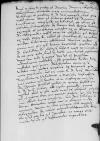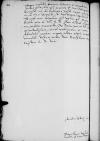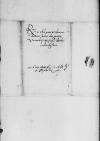⌊Volfgango⌋ in gratiam Reverendissimae Dominationis Vestrae concessa sunt, quae petiit, omnia, nam et litteras habet ad ⌊dominos consiliarios⌋ cuiusmodi postulabat, et alias ad ⌊senatum Gedanensem⌋ de damno dato deque litium expensis, et praeterea moratorias in biennium.
De ⌊Alexandro⌋ nihil prorsus allatum est. Rediit ex urbe ⌊Oczieski⌋, rediit et ⌊Gantkowski⌋; ne pilum quidem litterarum attulerunt. Uterque autem eorum non hic est, verum ⌊Cracoviae⌋. Scribam ad dominum ⌊Gantckowski⌋, fortasse litteris meis provocatus de iis, quae acta sunt in ⌊urbe⌋, me faciet certiorem. Urgeo iam inde a mense uno, ut in ⌊Prussiam⌋ cubicularius mittatur, sed quantum video, vix mittetur quisquam. Deliberatum enim esse videtur non petere amplius.
Ex ⌊Hungaria⌋ quae nova perscripta sunt, ea mitto Reverendissimae Dominationi Vestrae. ⌊Meilad⌋ ⌊Transilvaniae⌋ palatinus a ⌊vaivoda Valachiae⌋ dolo captus esse dicitur et in Sochaczow missus. De ⌊Ignatio Sculteti⌋ pridem in animo habebam Reverendissimae Dominationi Vestrae scribere, sed nescio quomodo semper excidit. Fuit ⌊is⌋ hic ante menses aliquot, questus est, se poenas dare pro peccato ⌊fratris⌋, ac sua una cum illius bonis confiscari, sive domino ⌊Plotowski⌋ donari. Quantum accepi, non in alienos modo iniurius, verum in suos quoque fuit impius ⌊Alexander⌋, de cuius importunitate multa, dum hic esset, questus est ⌊Ignatius⌋ ac mores eius omnes visus est vehementer improbare.  BCz, 1618, p. 424 Itaque misertus hominis litteras ⌊ei⌋ impetravi, quibus, quae sua esse propria et non ⌊Alexandri⌋ docuisset, ea sibi retinere posset, neque quisquam hidden by binding⌈[m]m hidden by binding⌉ in ea iuris aliquid sibi vendicare a written over , written over p⌈paa written over , written over p⌉uderet. Id mihi non iniquum esse visum est, neque dubito, quin et Vestra Reverendissima Dominatio idem iudicet.
BCz, 1618, p. 424 Itaque misertus hominis litteras ⌊ei⌋ impetravi, quibus, quae sua esse propria et non ⌊Alexandri⌋ docuisset, ea sibi retinere posset, neque quisquam hidden by binding⌈[m]m hidden by binding⌉ in ea iuris aliquid sibi vendicare a written over , written over p⌈paa written over , written over p⌉uderet. Id mihi non iniquum esse visum est, neque dubito, quin et Vestra Reverendissima Dominatio idem iudicet.
Cuius me gratiae commendo ac Deum precor, ut eam quam diutissime servet incolumem ac omni felicitatis genere magis in dies atque magis cumulet.
 BCz, 1618, p. 424 Itaque misertus hominis litteras
BCz, 1618, p. 424 Itaque misertus hominis litteras 

